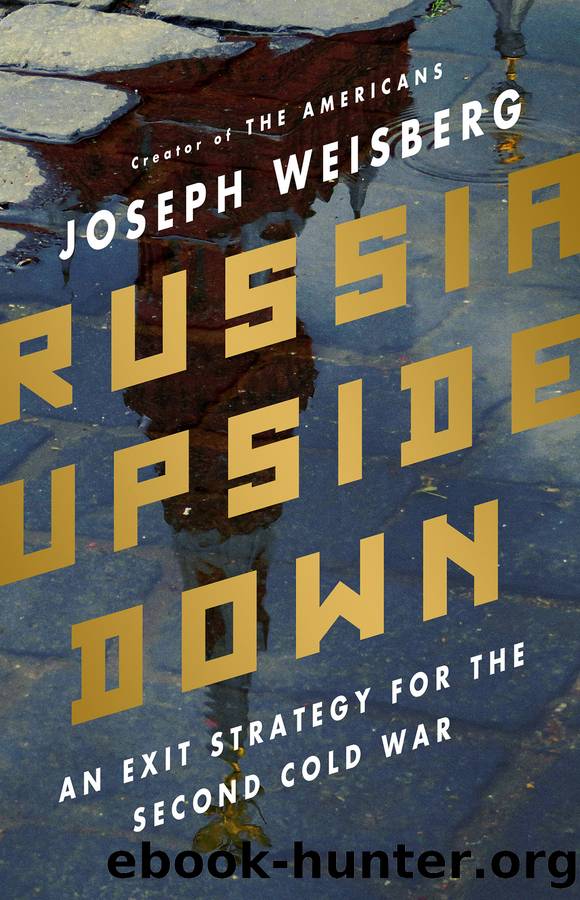Russia Upside Down: An Exit Strategy for the Second Cold War by Joseph Weisberg

Author:Joseph Weisberg [Weisberg, Joseph]
Language: eng
Format: epub
Tags: history, Russia & the Former Soviet Union, political science, Political Ideologies, Communism; Post-Communism & Socialism, World, Russian & Former Soviet Union
ISBN: 9781541768628
Google: pbwjzgEACAAJ
Publisher: PublicAffairs
Published: 2021-11-15T23:45:20.000933+00:00
There are still more risk factors for having a shallow, black-and-white view of another societyânot spending much time there, not speaking the language, not knowing enough people from there. I had all of these problems to varying degrees.
So did Reagan and Gorbachev. But both men may have gone through something similar to what I did, a reassessment of their basic beliefs and attitudes about the country they were fighting against in the Cold War. When Gorbachev met Reagan face-to-face for the first time at the Geneva Summit in 1985, the encounter changed his political viewpoint enough that he actually stopped using the language of communist propaganda that heâd relied on his entire life when talking about the United States. Reagan had proved to be a genuine person he could talk to and understand, not the stereotypical evil imperialist heâd expected. As Gorbachevâs view broadened, the old language didnât fit anymore. To understand this, you have to realize just how sheltered most Soviet leaders were, having been brought up with limited exposure to noncommunist ideas, and often having traveled little outside the country. For that matter, political leaders in general arenât necessarily more worldly or better informed than the average citizen of their country, which is easy to forget in light of their power and prestige.
As for Reagan, his hardline stance against the Soviet Union softened considerably in his second term. In 1988, he even publicly stated that the Soviet Union was no longer an evil empire. Although Reaganâs views were complicated and donât fit neatly into a narrative where he went from thinking the Soviet Union was bad to thinking it was less bad, thereâs little doubt that his views did alter to a degree in response to the changes Gorbachev was making in the Soviet Union.
Itâs also possible Reagan was influenced by Moscow Does Not Believe in Tears. Before his first meeting with Gorbachev in 1985, Reagan watched the movie, which his briefers thought might give him a window into the Russian soul. Itâs often claimed that Reagan was heavily influenced by movies. After seeing The Day After, a TV miniseries that offered a stark and realistic portrayal of the aftermath of a nuclear exchange with the Soviets, Reagan was deeply affected, but felt the movie showed why his policy of nuclear deterrence was right. His diaries donât support a popular version of this story that has him rethinking his position on nuclear arms after seeing the film.
But could Moscow Does Not Believe in Tears have had a major impact on how Reagan viewed the Soviet Union? The filmâs portrait of day to day life in Moscow is profoundly different from anything youâd ever imagine if you had a one-dimensional view of the Soviet Union. I like to think of Reaganâs fairy-tale notion of an evil empire colliding with the picture of real Soviet life in Menshovâs film, and not fully surviving the encounter. (The film is a romance, and I donât want to suggest itâs a full or literal portrait of Soviet reality.
Download
This site does not store any files on its server. We only index and link to content provided by other sites. Please contact the content providers to delete copyright contents if any and email us, we'll remove relevant links or contents immediately.
| Africa | Americas |
| Arctic & Antarctica | Asia |
| Australia & Oceania | Europe |
| Middle East | Russia |
| United States | World |
| Ancient Civilizations | Military |
| Historical Study & Educational Resources |
Machine Learning at Scale with H2O by Gregory Keys | David Whiting(4292)
Never by Ken Follett(3937)
Fairy Tale by Stephen King(3370)
Oathbringer (The Stormlight Archive, Book 3) by Brandon Sanderson(3154)
The Man Who Died Twice by Richard Osman(3072)
Will by Will Smith(2907)
Rationality by Steven Pinker(2352)
Can't Hurt Me: Master Your Mind and Defy the Odds - Clean Edition by David Goggins(2323)
The Dark Hours by Michael Connelly(2300)
Friends, Lovers, and the Big Terrible Thing by Matthew Perry(2219)
The Dawn of Everything: A New History of Humanity by David Graeber & David Wengrow(2191)
Principles for Dealing With the Changing World Order: Why Nations Succeed and Fail by Ray Dalio(2036)
A Short History of War by Jeremy Black(1842)
HBR's 10 Must Reads 2022 by Harvard Business Review(1839)
Go Tell the Bees That I Am Gone by Diana Gabaldon(1749)
A Game of Thrones (The Illustrated Edition) by George R. R. Martin(1719)
Kingdom of Ash by Maas Sarah J(1667)
515945210 by Unknown(1660)
443319537 by Unknown(1545)
